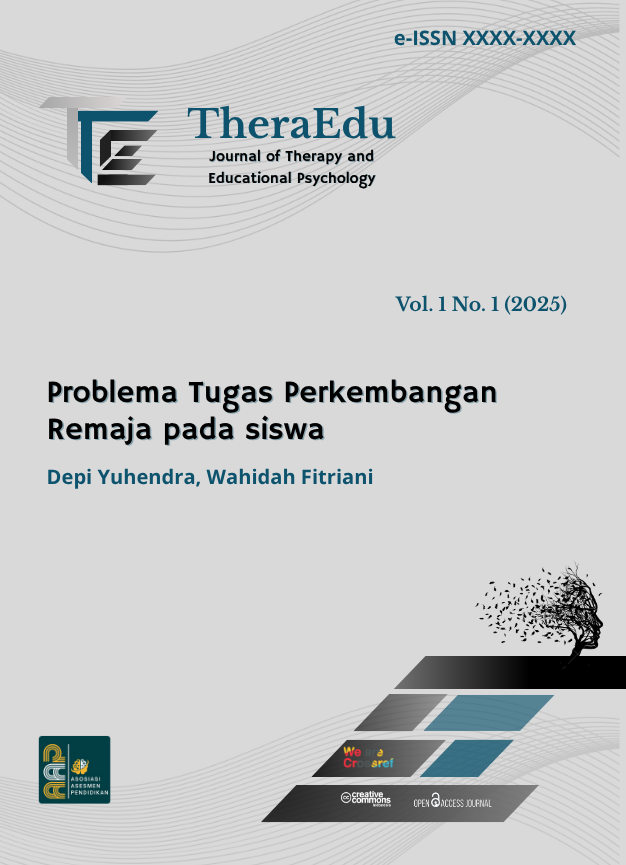Problema Tugas Terkembangan Remaja pada siswa
DOI:
https://doi.org/10.63203/021818000Keywords:
Konsep, Tugas Perkembangan Remaja, MasalahAbstract
The background of this research is that adolescents find it difficult to accept physical and psychological conditions at the stage of their development, because in childhood they have used the concept of self-appearance and ways to improve self-appearance so that it is more in line with what one aspires to be. The problem with this research is that early school-age adolescents still need guidance and development to find out the developmental tasks at their age, because in adolescence the physical, emotional and intellectual condition of adolescents can go through a developmental task crisis. physical growth, and psychology, the purpose of this research is to describe the developmental task problems experienced by students in the aspect of achieving socially responsible behavior, achieving emotional independence, achieving good relationships with both sexes, being able to accept physical conditions and use them optimally. effective and capable of developing the intellectual skills and concepts necessary for citizens. To find out this, the author uses qualitative research that describes what is about the problem. Data collection was carried out through inventory in the form of questionnaires to students. These observations were made on the tasks of early adolescent development. Based on the results of the research that has been done, it can be concluded that the developmental problems that are often experienced by adolescents are the problem of having a desire and responsibility for social behavior, namely ethics and techniques of getting along and giving respect to others, being less open to others, feeling insecure when talking to others, unable to express opinions, dislikes being criticized for actions and opinions, does not know how to spend money properly. In the problem of emotional independence, namely irritability and unable to control emotions, worry about families who are less warm or less pleasant, often feel sad, afraid to try something new, sometimes brave, shy and easily confused about something.
Downloads
References
Ali, Mohamad dan Asrori, Mohamad. (2005) Psikologi Perkembangan (Peserta Didik). Jakarta: Bumi Aksara
Al-Mighwar, Muhammad. (2006), Psikologi Remaja, Bandung: Pustaka Setia
Arikunto, Suharsimi. (1998). Prosedur Penelitian. Jakarta: Rineka Cipta
Arikunto, Suharsimi. (2006). Prosedur Penelitian Suatu Pendekatan Praktik. Jakarta:
PT Rineka Cipta
Arikunto, Suharsimi. (1997). Manajemen Penelitian. Jakarta: Rineka Cipta
B. Hurlock, Elizabeth. (1980). Psikologi Perkembangan (Suatu Pendekatan Sepanjang Rentang Kehidupan. Jakarta: Erlangga
Dzakia, Derajat. (1978). Membina Nilai-nilai Moral di Indonesia. Jakarta: Bulan Bintang
Hamalik, Oemar. (1995). Psikologi remaja (Dimensi Perkembangan). Bandung: Bandar Maju
Nawawi, Hadan dan Martini, Nim. (1996). Penelitian Terapan. Yogyakarta: Gajah Mada University Pers
Prayitno, Elida. (2002). Psikologi Remaja, Jurusan Bimbingan Konseling Fakultas UNP Padang
Sobur, Alex. (2003). Psikologi Umum. Bandung: Pustaka Setia
Sudijono, Anas. (2003). Pengantar Statistik Pendidikan. Jakarta: PT Grafindo Persada
Sundari, Rumini Sri. (2004). Perkembangan Anak dan Remaja. Jakarta: PT. Rineka Cipta
Susilowindadini. (1981). Psikologi Perkembangan II ( Masa Remaja). Fakultas Ilmu Pendidikan IKIP Malang
TIM pengembangan MKDK IKIP Semarang. 1989). Psikologi Perkembangan. Semarang: IKIP Semarang Pers
Willis, S, Sofyan. ( 1994). Problema Remaja dan Pemecahannya. Bandung: Angkasa
Yusuf, Drs, Syamsu LN. (1994).Psikologi Perkembangan Anak dan Remaja. Bandung: Rosdakarya

Downloads
Published
How to Cite
Issue
Section
License
Copyright (c) 2025 Depi Yuhendra, Wahidah Fitriani

This work is licensed under a Creative Commons Attribution 4.0 International License.
Similar Articles
- Syifa Leonida, Sarah Anjani, Hendry Sugara, Kesehatan Mental Dalam Konteks Tekanan Ekonomi: Pendekatan Studi Kasus , TheraEdu: Journal of Therapy and Educational Psychology: Vol. 1 No. 1 (2025): TheraEdu: Journal of Therapy and Educational Psychology
- Laili Ulima, Ririn Eka Septianawati, Systematic Literature Review (SLR) : Konseling Kelompok dengan Pendekatan Realita , TheraEdu: Journal of Therapy and Educational Psychology: Vol. 1 No. 1 (2025): TheraEdu: Journal of Therapy and Educational Psychology
- Zikry Latupasjana Ersya, Rafli Dwilianto, Analisis Model ABC REBT (Rational Emotive Behavior Therapy) dalam Memahami Respon Emosional Pelaku Bullying: Sebuah Studi Literatur , TheraEdu: Journal of Therapy and Educational Psychology: Vol. 1 No. 2 (2025): TheraEdu: Journal of Therapy and Educational Psychology
You may also start an advanced similarity search for this article.




















